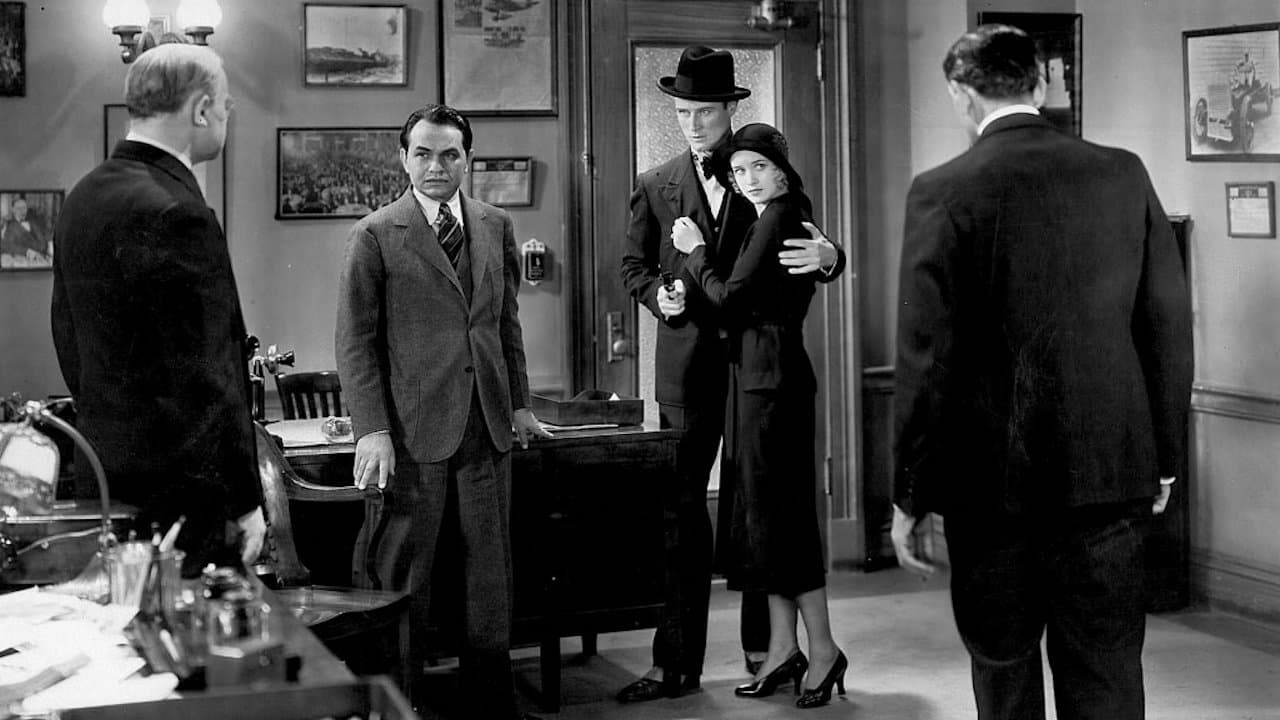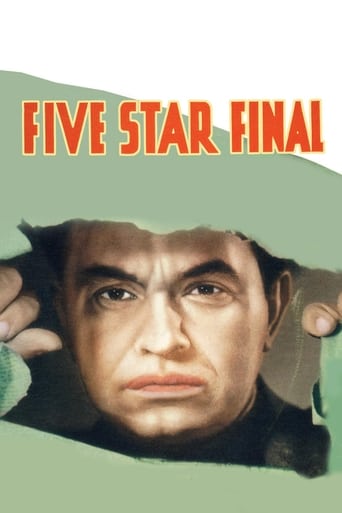

"Five Star Final" is one of the best films Edward G. Robinson made after "Little Caesar." He was working with the same director from that other film, Mervyn LeRoy and they both deliver the goods. The story concerns the editor of a sleazy, controversial New York newspaper who buckles under pressure from his superiors in resurrecting a 20 year old murder case. Robinson's superiors at the newspaper, feel the case has some loose ends and as it happens, they are right. During the film, Robinson realises that ethics don't exactly figure very much at his place of employment. He begins to develop a conscience about covering the story and grows to hate what he does. All of Robinson's scenes are filmed in the same set but that doesn't affect his performance. Regarding the newspaper story in question, a decent family are holding a skeleton in their closet and only the husband and wife know about it. They need to prevent their young daughter from knowing the truth as much as possible. Boris Karloff plays a sly and devious journalist who is given the job of gathering any information about the family. "Five Star Final" highlights things like bigotry and prejudiced attitudes in a fine screenplay. There is none of the wise- cracking humour in this film, just a dose of stark reality. It is a powerful film with a terrific performance from Edward G. Robinson and great direction from Mervyn LeRoy.
... View MoreScathing Indictment on Yellow Journalism. It is a Timeless Tale of the Human Condition. Sordid Gossip and the Exploitation of Anyone or Anything Used to Sell Something. Today it's Ratings, in 1931 it was Circulation.Edward G. Robinson is Energetic and Willing to Do What the Bosses Want and Dig Up Dirt and Mud Sling just Because it's His Job, and He is Good at it and gets Well Paid. Damn the Consequences.In this Pre-Code Movie the Reporters Stereotypical Drinking is in Full Force with Little Regard for Prohibition and there are Racial Slurs and Other Pre-Code Stingers. The Cast are All Delivering Expected Dated Histrionics with Boris Karloff Giddy as a Defrocked Priest Posing as a Priest to Get the Goods. Overall, Above Average Pre-Coder with Some Interesting Montages Amidst the Sleek Photography, and a Distinct Message that is Still Relevant Today. Nominated for a Best Picture Oscar.
... View MoreEdward G. Robinson works for a tabloid, that sensationalizes the news and cares more about its numbers of readers than having a dignified reputation. When it decides to run a story of "What Ever Happened to..." about a young pregnant lady who shot the father of her baby years ago, when he wouldn't marry her, the film shows how it affects the lady's current family. The case made headlines years ago, and it's a capital idea to write about it now, of course, because the readers want to know, have to know, really care about it. Costarring Aline MacMahon, as Eddie's secretary who's in love with him and Boris Karloff in a memorable role, this is one hard-hitting film, that pulls no punches. What's unique about it is that there's no music score. It begins and ends with the sound of the newspaper machines running. Its frank and brutal way of telling the story and fleshing out its character make this a film that you won't likely forget, especially with the speech made at the end of the film by the young daughter of the lady who shot her father. By the end, you may feel preached at, because it's not subtle, but that's the point of the film. That all actions have consequences, and that the heart of the story is the people, and that newspapermen have to show respect for their subject. Before Absence of Malice came Five Star Final telling a story that's timeless.
... View MoreOf all people, can that actually be Frankenstein groveling before a newspaper editor (Robinson). Yes indeed, it's the great Karloff as a reporter making extra nice-nice and a bit tipsy too—it does take some getting used to. He's certainly out of usual character, over-acting as well (perhaps the only time in a generally restrained career), but then exaggeration is the style of these early talkies.Karloff aside, the movie's a hard-hitting expose of the cut-throat newspaper industry back when 'extra editions' were the chief news outlet and people flocked around news stands. Pity poor Nancy Townsend (Starr). She's served her time for a sensational murder and is now a respectable housewife. Trouble is the Gazette, its greedy owner, and editor Randall, need to boost circulation, so why not resurrect her murder case. Who cares that it may ruin her now reformed life when there's extra dollars to be made. Some pretty dramatic scenes ensue, and few punches are pulled, especially that sardonic very last shot.No doubt about it, director LeRoy is one of the masters of early talkies. The staging of the two tragic Townsend scenes is movingly done, while the split screen run-around really brings out the cruelty of the Gazette staff. This is pre-Code (1931) and some innuendo surfaces at the beginning with chippie Kitty Carmody (Munson), otherwise there's little that post-1934 would find objectionable.This is First National Pictures on the eve of merging with Warner Bros. to complete that powerhouse studio of the 1930's. There's Warner's trademark vigor and 'every dayness' that help lift this movie beyond the ordinary and also show why the very unglamorous Robinson was such a force in early talkies. All in all, it's a smoothly energetic installment in pre-Code Hollywood.In passing-- catch that 1930 state-of-the-art radio, almost big enough to sleep in. These really old movies are a good chance to view early editions of familiar technology and be entertained at the same time.
... View More